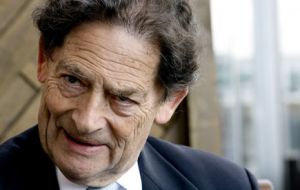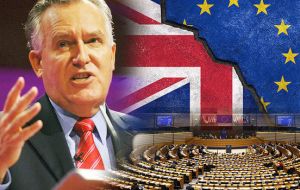MercoPress. South Atlantic News Agency
Brexit Lords' debate: Labour has tabled eight amendments
 The list of likely speakers includes former chancellors Lord Lawson (Pic), Lord Lamont and Lord Darling, former foreign secretaries Lord Hague and Lord Owen
The list of likely speakers includes former chancellors Lord Lawson (Pic), Lord Lamont and Lord Darling, former foreign secretaries Lord Hague and Lord Owen  Lord Hain, a former Northern Ireland Secretary argued that two thirds of Labour electors voted to Remain. “But what about the 48% who voted Remain?”
Lord Hain, a former Northern Ireland Secretary argued that two thirds of Labour electors voted to Remain. “But what about the 48% who voted Remain?” The House of Lords are to begin debating the bill paving the way for the start of Brexit. MPs agreed the proposed law unchanged, authorizing Theresa May to inform the EU of the UK's intention to leave. But the government does not have a majority in the House of Lords and eight amendments have been tabled by Labor's front bench.
Opposition and crossbench peers are seeking guarantees about the rights of EU citizens in Britain and the role of parliament in scrutinizing the process. Mrs May has said she wants to invoke Article 50 of the 2009 Lisbon Treaty, the formal mechanism by which a state must leave the EU, by the end of March.
The government has set aside five days of debate in total for the various stages of the EU (Notification of Withdrawal) Bill - starting with its Second Reading, when the Lords will debate the general principles of the bill. More than 190 peers have requested to speak during Second Reading, which starts at 15.30 GMT and will conclude on Tuesday.
Labour says one of its amendments is intended to give parliament a “final meaningful vote” on the draft Brexit agreement before MEPs get a chance to do the same. The list of likely speakers includes former chancellors Lord Lawson, Lord Lamont and Lord Darling, former foreign secretaries Lord Hague and Lord Owen and former Cabinet Secretaries Lord O'Donnell, Lord Butler and Lord Armstrong.
Others expected to contribute include former UKIP leader Lord Pearson and Lord Pannick, the QC who led the successful legal challenge against the government, culminating in the Supreme Court ruling that the prior approval of Parliament was needed before Article 50 was invoked.
Detailed scrutiny of the bill at committee stage is due to take place on 27 February and March first. If the bill is not amended, then it could theoretically be approved by the Lords at Third Reading on 7 March, becoming law shortly afterwards.
If peers do make changes to the bill, it would put them on a collision course with MPs - who overwhelmingly passed the bill unaltered and would be expected to overturn any Lords amendments.
Speaking on Sunday, former Labour cabinet minister Lord Mandelson urged peers to show “courage” and not wave the bills through without debate. Justice Secretary Liz Truss said she expected the unelected second chamber to respect the “will of the people” expressed in last year's referendum
But Lord Hain, a former Northern Ireland Secretary, maintains he has a mandate to seek changes despite being an unelected peer.
He said: “I was appointed by my party. And in the referendum, two thirds of Labour electors voted to Remain. I don't deny they won, or that the outcome has to be respected. But what about the 48% who voted Remain?”
Although the Conservatives have the largest number of peers in the Lords, with 252 members, they are vulnerable to being outvoted if opposition peers - including 202 Labour peers and 102 Lib Dems - join forces. Much will hinge of the actions of the 178 crossbenchers in the Lords - who are not aligned to any party and do not take a party whip.




Top Comments
Disclaimer & comment rulesCommenting for this story is now closed.
If you have a Facebook account, become a fan and comment on our Facebook Page!